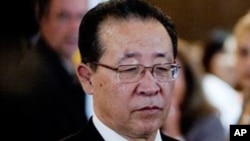Senior U.S. and North Korean Diplomats meet in New York Thursday for what the State Department calls “exploratory” talks on Pyongyang’s willingness to resume negotiations over its nuclear program. The talks follow a meeting between North and South Korean negotiators last week on the sidelines of the ASEAN Regional Forum in Bali, Indonesia. .
The meetings at the U.S. mission to the United Nations are expected to extend into Friday, and the Obama administration says it will use the “exploratory talks” to determine if Pyongyang is serious about living up to nuclear obligations.
North Korea agreed in principle in 2005 to scrap its nuclear program, including a presumed small arsenal of nuclear weapons, in return for aid and diplomatic benefits from other countries in Chinese sponsored six-party negotiations.
But the negotiations broke off in 2008 and relations between Pyongyang and Seoul spiraled downward last year amid North Korea’s alleged sinking of a South Korean warship and shelling of a South Korean island.
The United States issued an invitation for the New York meeting after nuclear negotiators of the two Koreas had what both sides said was a constructive meeting in Bali.
State Department Deputy Spokesman Mark Toner says the New York meeting is a logical next step.
“We’ve said very clearly for a long time that we were first looking for improved dialogue between north and south," said Toner. "That was one of the initial steps that we wanted to see take place, and in fact when that meeting did take place in Bali, it was a constructive meeting. And so we felt that the logical next step was to have this exploratory meeting, before we take any more steps, to judge how North Korea is approaching this.”
Toner said U.S. special envoy for North Korea Stephen Bosworth will lead an inter-agency team at the New York meeting.
The North Korea side will be led by Vice Foreign Minister Kim Kae-Gwan. It will be the highest-level U.S.-North Korean encounter since a Pyongyang visit by Bosworth at the end of 2009.
Secretary of State Hillary Clinton said late last week in Bali the meeting will probe whether Pyongyang is ready to take “concrete and irreversible” steps toward de-nuclearization.
She said while open to talks, the United States does not intend to reward the north for returning to the table and it cannot expect new benefits for steps it has already agreed to take.
Korea policy experts in Washington say the engagement with North Korea, while worthwhile, is unlikely to yield a breakthrough such as an early resumption of the six-party talks.
Bruce Klingner, Senior Research Fellow for Northeast Asia at the Heritage Foundation, says refusing to talk to Pyongyang would be naïve, though it may have no intention of giving up its nuclear program.
“There are very few experts who actually believe that and I’m very skeptical," said Klingner. "In a way, if you think of it from North Korea’s point of view, it wouldn’t make sense to give up their nuclear weapons because it not only provides some military benefits, but in a way it make them relevant. Without nuclear weapons, it would be easier to ignore North Korea.”
Nonetheless Klingner, a former U.S. intelligence official, said a combination of incentives and sanctions might still change Pyongyang’s mindset and “cost-benefit analysis” about the nuclear program.
Klingner’s sense of caution about the New York talks is shared by Jonathan Pollack, a Senior Foreign Policy Fellow at the Brookings Institution, who says there is no evidence Pyongyang feels compelled to bargain away its nuclear program.
The Brookings expert says North Korea may still entertain hope that it can have a direct dialogue with the United States at the expense of South Korea while deferring disarmament steps. If that is the case, Pollack says, it will come away disappointed.
“The North Koreans are trying to see if yet again, they can reach some kind of agreement with the United States that defers consideration of the status of their programs," said Pollack. "I would anticipate in this context that they may broach yet again the idea of a peace agreement with the United States to replace the [1953 Korean War] armistice. But this is something that the U.S. is not going to entertain as a stand-alone action apart from South Korea. We simply will not.”
State Department Spokesman Toner stressed repeatedly Wednesday that the U.S. side will closely coordinate its approach with South Korea. He said North Korea’s pending request for new U.S. food aid is not part of the New York agenda.
The North Korean nuclear issue: 1985 - 2011












